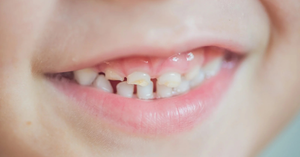Thumb sucking is a natural reflex in children, providing comfort, security, and sometimes even helping them fall asleep. While this habit is generally harmless in infancy, it can pose risks if it persists beyond a certain age, particularly to dental and oral development. One of the most common dental issues linked to prolonged thumb sucking is the development of an overbite. This article will explore the connection between thumb sucking and overbites in children, how this habit impacts dental health, and what parents can do to manage it effectively.
The Importance of Thumb Sucking in Early Childhood
In early infancy, thumb sucking is a reflex that helps babies learn to self-soothe. Many infants will start sucking their thumbs or fingers soon after birth, and for the first few years of life, this habit can serve important emotional and developmental purposes. It helps to calm babies when they are anxious, tired, or hungry, and can even promote a sense of security as they grow and face new environments.
Most children naturally stop thumb sucking between the ages of two and four. At this stage, the habit is typically harmless and doesn’t affect the development of teeth or the jaw. However, when thumb sucking persists beyond the toddler years, especially into school age, it can start to interfere with the proper alignment of teeth and the development of the jaw, leading to dental issues like overbites.
How Thumb Sucking Affects Dental Development
Prolonged thumb sucking can have significant consequences on the dental structures in a child’s mouth, particularly the alignment of the teeth and jaw. Continuous pressure from the thumb against the upper front teeth can cause the teeth to gradually move outward. This is known as an overbite, a condition where the upper front teeth extend beyond the lower front teeth when the jaw is closed.
Main ways thumb sucking can affect dental development
1. Overbite Formation: As mentioned, the repetitive pressure of the thumb against the upper teeth can cause them to move out of alignment, leading to an overbite. In severe cases, this misalignment may require orthodontic treatment, such as braces or retainers, to correct.
2. Open Bite: In some cases, thumb sucking can also lead to an open bite, where the upper and lower teeth do not meet when the mouth is closed. This can affect chewing, speech, and even aesthetics, making orthodontic intervention necessary.
3. Changes to the Jaw and Palate: Prolonged thumb sucking can also alter the shape of a child’s jaw and palate. The constant pressure of the thumb can cause the roof of the mouth to narrow, leading to a higher, arched palate. This may result in crowding of the teeth as they erupt, increasing the likelihood of needing orthodontic treatment in the future.
4. Speech Development Issues: The changes in the structure of the teeth and jaw can sometimes lead to speech problems, such as difficulty pronouncing certain sounds, particularly those that require the tongue to press against the front teeth, like "s" and "th."
When to Be Concerned About Thumb Sucking
For many children, thumb sucking is a temporary habit that fades naturally as they grow older. However, it becomes a concern when it persists past the age of four or five, when permanent teeth start to come in. At this stage, the habit can interfere with the alignment of the teeth, causing dental problems like overbites, open bites, or cross bites.
Here are some signs that thumb sucking may be impacting your child’s dental health:
- The front teeth are starting to protrude noticeably.
- The upper and lower teeth do not meet when the mouth is closed (open bite).
- The child has difficulty chewing or biting food properly.
- Speech issues, especially trouble pronouncing certain sounds.
- A noticeable gap between the upper and lower teeth.
If you observe any of these signs in your child, it may be time to consult with a pediatric dentist or orthodontist for an evaluation. Early intervention can help prevent more severe dental problems down the road.
Strategies to Help Stop Thumb Sucking
Helping a child stop thumb sucking can be challenging, especially if they use it as a form of comfort. However, there are several strategies parents can use to help their children break the habit:
1. Positive Reinforcement: Praise and reward your child for not sucking their thumb. This could be as simple as offering encouragement or using a reward chart to track progress.
2. Provide Comfort Alternatives: Since thumb sucking is often a comfort mechanism, provide alternative methods of self-soothing, such as a favorite toy, blanket, or comforting activity like reading a book together.
3. Use Reminders: Some parents use gentle physical reminders, like placing a bandage or thumb guard over the child’s thumb to make them more aware of the habit.
4. Consult a Professional: If thumb sucking persists and is affecting your child’s teeth, a dentist or orthodontist may recommend additional interventions, such as a special oral appliance that discourages thumb sucking or counseling to address the emotional triggers behind the habit.
Conclusion
While thumb sucking is a normal part of early childhood development, it’s important for parents to monitor the habit as their child grows. If thumb sucking continues past the age of four or five, it can have lasting effects on dental health, including the development of overbites, open bites, and other dental issues. By understanding the connection between thumb sucking and dental development, and taking steps to help your child stop the habit, you can help ensure their teeth grow properly and reduce the need for orthodontic treatment in the future.
If you have concerns about your child’s thumb sucking habit or notice signs of dental misalignment, don’t hesitate to reach out to a pediatric dentist for guidance. Early intervention can make a significant difference in preventing long-term dental complications.









Be the first one to comment on this story.